I love coconut water! When I’m traveling in the tropics, there is nothing better than drinking water straight from a coconut. Mother nature designed the perfect vessel for a drink that is so refreshing, slightly sweet, and keeps you hydrated in hot climates. You’ve probably heard that coconut water makes an excellent hydrating drink that replenishes electrolytes and can replace nasty chemical-filled Gatorade and Powerade – but there really is more to it than that. How do you buy the healthiest coconut water and avoid the worst?
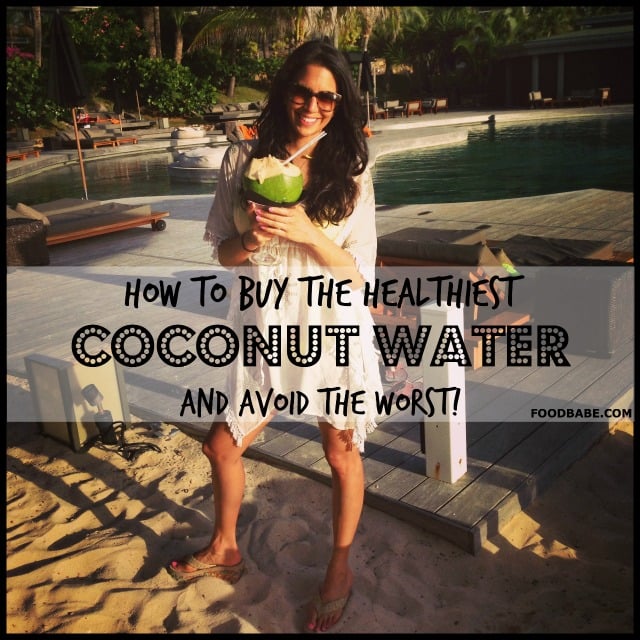
Coconut water is one of the healthiest drinks on the planet
Coconut water contains a unique combination of B vitamins, vitamin C, micronutrients, and phytohormones that are exceptionally beneficial to your health. A scientific review of coconut water, published in the journal Molecules, highlights some of the ways that coconut water replenishes your body:
- Helps to prevent heart attacks
- Lowers high blood pressure
- Can have anti-aging effects
- Fights free radicals to help prevent cancer
- Contains trans-zeatin which can be used to treat Alzheimer’s disease or dementia
That being said, I don’t want you to think it’s okay to pick up just any coconut water off of the shelf. Packaged coconut water is really flooding into the market recently. You can find it in bottles, cartons or powdered, frozen, flavored, carbonated, and sweetened. With all these choices it can be confusing and difficult to know if you are choosing the best one.
It usually costs at least $3 bucks a bottle, so it’s not exactly affordable- and if I’m going to spend my hard earned money on some, I make sure it’s worth it! Primarily, I look for coconut water that is the least processed and still has the majority of its nutrients intact. This is always going to be directly from a fresh coconut – but, of course that’s not always available. If you haven’t already heard, Pepsico and Coca-Cola have their own versions of coconut water – (O.N.E., Zico, Naked) – and you can only imagine what the corporations have done to it.
How To Ruin Coconut Water
Using a concentrate instead of fresh juice: Some coconut water companies get away with saying their drinks contain “100% Coconut Water” that’s “All Natural” even though it’s made from a reconstituted concentrate. Just like other juices in the store, they heat fresh coconut water and reduce it to a syrup. It’s cheaper for them to import this coconut water syrup, which they later add water prior to packaging. Any juice that has been heated to this extent loses a significant amount of its nutrients and its beneficial enzymes are denatured (i.e. the enzymes don’t work anymore).
Taking water from mature coconuts: This is a biggie. Young coconuts on the tree are usually green with an abundance of water in the center that is full of nutrients. Anyone that drinks coconut water straight from a coconut is drinking out of one of these young coconuts. As they begin to age, the nutrients in the water begin to seep into the meat of the coconut, and the water becomes less nutritious. It’s essentially watered-down. This also happens when young coconuts are picked and allowed to lie on the ground in the sun, for an extended period of time. While older “mature” coconuts might be used to make coconut oil, coconut milk and other coconut products, the coconut water from older coconuts is often discarded because it’s lacking nutrients and doesn’t taste the same. As the popularity in coconut water spiked recently, companies realized that they could buy up the water from mature coconuts and could get it cheaper than young coconut water. This is why it’s important to drink young coconut water and not get scammed into drinking the watered-down and less nutritious version.
Adding “natural flavors” or sweeteners: Young coconut water is refreshing and sweet, so there is absolutely no need to flavor or sweeten it – unless you are trying to hide something. Guess what happens when they use mature coconuts for their water? It tastes acidic, so they mask this taste with natural flavors or sweeten it up with sugars. I’ve heard that some companies use a centrifuge system to remove the acidic taste, but it’s a safe assumption that if you see a plain coconut water on the shelf with any natural flavors or sweeteners added it is from mature coconuts and not worth your money.
Pasteurizing it with heat: Coconut water is very delicate, naturally perishable, and should be kept cold. Have you ever stopped to wonder why most bottled and boxed coconut waters on the shelves aren’t in the refrigerated section? I recently checked out one of these bottles and noticed it didn’t expire for 2 years! This is because most coconut water at the store is heat pasteurized, which literally means that it’s been cooked to a very high temperature to kill bacteria and extend its shelf life. It has been shown that heat also destroys some of the vitamins, minerals, and phytonutrients and also denatures enzymes – stripping its benefits and much of its flavor. If coconut water is from concentrate, this would be the second time it’s heated. Obviously, your best bet is to seek out and find unpasteurized raw coconut water. This can be hard to find, but there is another way to kill bacteria while keeping the nutrients intact: HPP (high pressure processing). Without using heat, HPP is best way to preserve the goodness in coconut water, while extending its shelf life a little to make it more available commercially.
Dipping whole coconuts in formaldehyde or sodium metabisulphite: It’s been reported that some non-organic coconuts may be preserved for transport to the U.S. by dipping them in chemicals, including formaldehyde a known carcinogen. This leads to the possibility that these chemicals seep into the coconut meat and poisons the water. Some of my favorite organic cafes avoid this by getting frozen coconut water shipped directly to them.
We called up several of the most popular coconut water companies and asked where they source their coconuts (young vs. mature), if they dip them in chemicals, how they pasteurize them, and about additives and preservatives that they may use. We got a variety of responses, and it’s almost surprising to me how much some of these companies have screwed up something as basic as coconut water. I found several brands to avoid, because they are so heavily processed that the final product barely resembles natural coconut water.
Coconut waters to avoid at all costs:
Naked Juice Coconut Water – Although it’s not from concentrate, Naked told me that they use “mature” coconut water that is flash pasteurized with heat. The plain variety doesn’t have any additives, but all of the flavored ones have added natural flavors. This is also a Pepsico brand – a company that spent over $4 Million dollars to fight GMO labels – so they aren’t getting any of my business.
O.N.E. Coconut Water – This is another Pepsico brand that is flash pasteurized with heat. The flavored waters “with a Splash of Fruit Juice” contain natural flavors and “sugar” as an ingredient. As it doesn’t say “cane sugar” on the label, this could very well be from GMO sugar beets.
Pepsico told me that they couldn’t confirm whether their sugar is GMO because:
“the exact source of the sugar in our coconut water cannot be confirmed because we source our ingredients from around the world and that information is not available at this time. Please know that all of our products comply with all applicable food laws and labeling requirements. O.N.E. Coconut Water relies on the regulatory agencies charged with safeguarding our food supply when sourcing ingredients for our products”.
They are relying on the FDA’s regulations to protect us, although the FDA themselves say that the manufacturer is responsible for ensuring the safety of the ingredients used in their products, including GMOs.
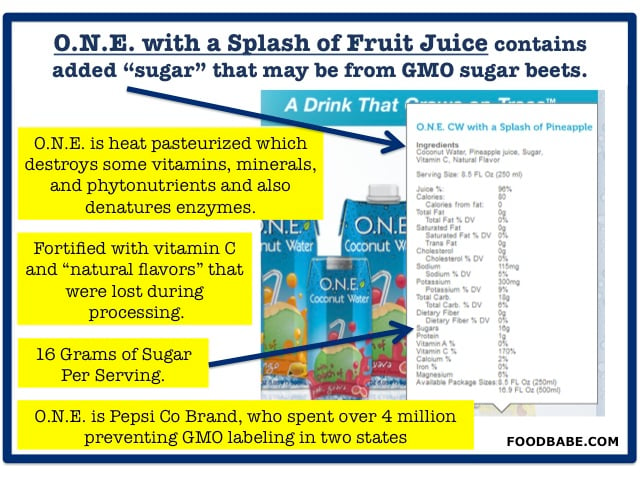
Zico – They sell two entirely different coconut waters depending on which packaging you choose. The waters in the bottles are made from concentrate and are a “blend of Asian coconuts” with natural flavors added. On the other hand, the ones in the tetra-pak cartons are not made from concentrate, have no additives, and contain only Thai coconut water that is packaged in Thailand. A bit confusing, isn’t it? While the tetra-paks (boxed) seem like a good choice, they use “Ultra High Temperature Pasteurization” to give it a long shelf life. This means it’s heated well above boiling point to 280 degrees Fahrenheit, which “kills everything” according to Scientific American, including beneficial nutrients. Plus, in case you didn’t hear the news, they were recently acquired by Coca-Cola – a big supporter of GMOs who have spent over 3.2 million to prevent GMO labeling.
CocoZona – We called and emailed them on several occasions, and they never replied to any of our questions – not even a peep! I always find it alarming when a company refuses to stand behind their product and isn’t transparent about their practices, especially since some companies have been caught lying about what’s really in the bottle. So, at this point, we know little more than what’s printed on the bottle of CocoZona, and the ingredient list reveals that it is made from concentrate. That’s enough reason to stay away from it.
Vita Coco – Don’t be fooled by all of those celebrity endorsements! Their waters are not made from concentrate, but they are all pasteurized with heat. Many of the flavored versions contain added sweeteners and the Cafe versions contain carrageenan. Even the seemingly plain 100% pure version contains added “fruit sugar.” Watch out for their coconut waters targeting kids, which are loaded with added sugar and many different natural flavors – they are not 100% coconut water! According to their website, Vita Coco Kids is also ultra high temperature pasteurized.
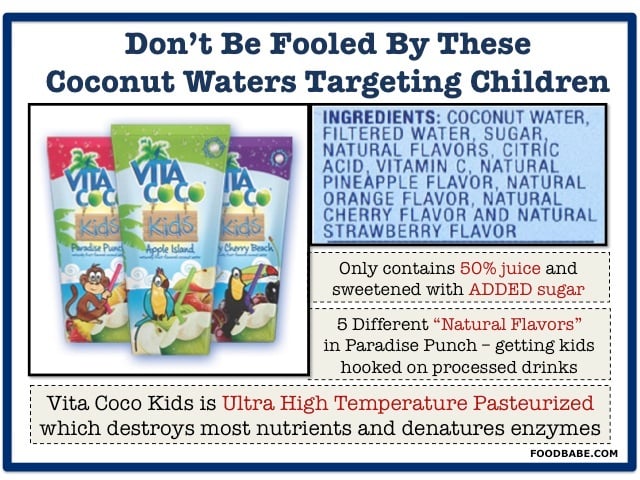
GOYA – This brand is heat pasteurized and contains added preservatives. Some versions are sweetened with sugar, which may be GMO. Because I vote with my dollars, I avoid any GOYA brand product as they spent over $56K to fight GMO labeling in California.
C2O – They told me they heat pasteurize their water up to 120 degrees celsius once the product is in the can for as long as 5 minutes. Although, they use no additives or concentrates, the length of this high heat processing puts it squarely on my avoid list.
Purity Organic – It’s made from concentrate and flash pasteurized with heat, so some of the goodness has been destroyed. It’s organic I know, but not all organic products use the best practices!
Coco Libre (Organic) – It’s made from concentrate, flash pasteurized with heat and has added “natural flavors.”
How do other popular coconut waters stack up?
Munkijo (organic) – This water isn’t from concentrate, contains no additives or added sugars and their young coconuts are sustainably grown and harvested. But I’m sorry to report they also use ultra high heat pasteurization to process their waters, so it’s far from the best on the market.
Coco Hydro by Big Tree Farms (organic) – I really like Big Tree Farms’ mission geared towards sustainability. Their unique version of coconut water is powdered and comes in packets that travel easily. So, there is no pasteurization involved, you just add water to reconstitute it. However, the process they use to evaporate the water uses heat, so it is not considered raw and some of the nutrients may be destroyed in the process.
Taste Nirvana (organic) – No concentrates or additives in this brand, and their young coconuts are sustainably grown, harvested and organic (though not labeled as such). I really like how it’s packaged in glass bottles. They are the only company that told me they use a “steam sterilization” process which is a combination of steam and pressure.
Amy & Brian (organic) – Other than the fact that they flash pasteurize the water, all other aspects are good – no additives, no added sugars, no concentrates. They also told me that their young coconuts are not treated with any chemicals or pesticides. I have to admit though, I’m not a fan of the cans they are in, even if they are BPA-free.
Harvest Bay (some varieties are certified organic) – They flash pasteurize their water for about 2 seconds at 120 degrees, and it’s not from concentrate. Some of their waters are now organic, and they are all non-GMO project verified. Although they add no sugars or additives to their plain version, most flavored varieties contain added sugar or natural flavors, so I’d avoid those.
Whole Foods 365 – They confirmed they don’t use a concentrate, however they heat pasteurize their water which comes “from around the world depending on availability”. Their water is also packaged in cans, which I don’t like!
Trader Joe’s – Their water is not from concentrate, but it is pasteurized. I have yet to hear back from them in regards to how they pasteurize their water (whether they use flash or ultra processing). They fortify their water with added vitamin C, which is a red flag that it has been heavily processed.
My top picks for packaged coconut water:
***This chart contains examples of the coconut waters we researched, however, there are many more available on the market or may be available in your neck of the woods. Please use this post as a guide to find the best coconut water in your area.***
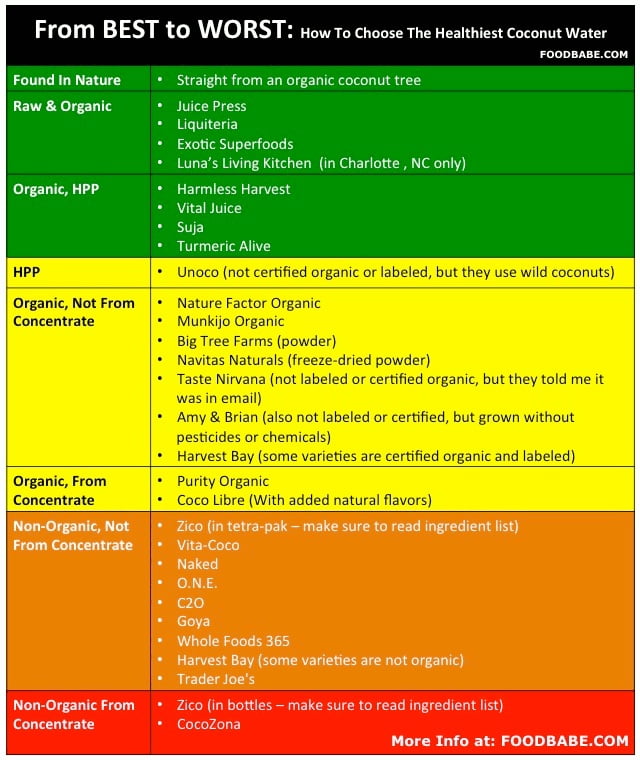
While the best coconut water is straight from a young coconut picked from a tree, these packaged waters below are as close to the real thing as you can get. They don’t use any heat processing or concentrates, so they aren’t cooking your coconut water. Some of them use HPP to kill bacteria, and a couple of these brands serve it up completely raw and unpasteurized.
Harmless Harvest (organic) – I’ve written about this brand before, and it’s no secret that they are my favorite. I had the pleasure of meeting with the founders of Harmless Harvest and I’m blown away with how open and honest they are about everything. They’ve become a success not because of marketing, but because of their good practices. In fact, they hardly spend any money on marketing at all (and bloggers are not compensated either). They source their young coconuts from small organic agroforestry farms that pay a fair wage to their workers. The coconuts are then frozen and shipped to the U.S. for packaging, after which they use HPP processing to kill bacteria and extend the shelf life to 60 days. Because it’s so minimally processed, some of the waters turn pink when the naturally occurring antioxidants or phenols are exposed to light – and you won’t find this in pasteurized coconut water. You can find this at Whole Foods and most natural food stores in the refrigerator section.
Juice Press (organic) – This water is totally raw. It’s not pasteurized or processed with HPP. Their coconuts are shipped frozen to the store and then they ship it fresh to you with a 3 or 4 day shelf life.
Exotic Superfoods (organic) – Another fave, this water is 100% organic and raw. It is not processed with any heat or HPP – but it’s kept frozen to preserve freshness.
Liquitera (organic) – This bottled raw coconut water is also organic, without any pasteurization. It’s only available at their stores in New York.
Vital Juice (organic) – It’s never heated or frozen, and it’s preserved with HPP, 100% organic and non-GMO project verified. It is currently only available at stores in Washington and Oregon with plans of expansion, and you can also order it online on Amazon.
Unoco (wild coconut) – Made from wild coconuts (not from a plantation) and processed with HPP without any additives. It’s only available in California right now.
Suja (organic) – Suja makes a coconut water blend, Tropicaloe, which is made from freeze-dried coconut water mixed with pineapple, apple, aloe, lime, mint and spinach juices, all preserved with HPP. This juice is exclusively sold at Whole Foods stores.
Keep in mind that while I think coconut water is amazing, I don’t drink it every day, I use it as a treat or on days I am very active and sweat hard!
If you know someone who loves coconut water or needs a great substitute for soda, Gatorade, Powerade or other unhealthy drinks – please share this post!
We must educate as many people as possible about their choices to change the marketplace. When we change the marketplace and start spending our money on the best and safest brands, we change the world!
Xo,
Vani





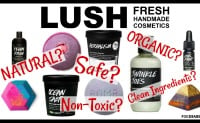


Vani,
I am almost scared to ask this…but have you researched IZZE “juice” drinks? I can’t find it on your page anywhere and I am wondering if you know what the “natural flavors” are…. sigh. I am sipping one right now and am tempted to throw it out, thinking is that the beaver stuff????
HELP! :/
Just look at who their parent company is (pepsico) and stop drinking them.
where can I find the natural drink coconut water in Italy?
In Italy my favorite is OCOCO, have a look http://www.ococo.eu
Hello
What do you think of BluePrint Juices?
Looks like Juice Press is the way to go
COSTCO IS SELLING COCONUT WATER. Brand name: KIRKLAND SIGNATURE. It comes in a tetra pak.
Ingredients : Coconut water,Vitamin C. Also says a natural product; taste and color may vary. Says Product of Brazil.
Claims not from concentrate, no added sugar rich in potassium
I’m curious about the Costco brand coconut water as well. My company stocks the office refrigerator with this brand. Any feedback would be greatly appreciated!
Hooray for Harmless Harvest! Saw them a few years back in a New York City deli and loooooooooved their product (love to get a pink one!), always grab a bottle to enjoy and support their cause!
Thank you for your support April!
Are you at all familiar with the Buycott app? Could you design a ‘campaign’ of brands/products you’d support?
Now if I could just find some info. on the best coconut milk! Currently using So Delicious.
READ YOUR LABELS!!
Something I learned recently about carton coconut milk is that many contain carageenan. It’s primarily used as a thickener to prevent any separation and to give lower fat items more richness…however, there are possible side effects. I still have a lot to learn, but below I copy & pasted a few sentences from a Prevention article related to the stuff. I switched to Silk brand “Almond Coconut” milk (I’m sure I’ll eventually learn something bad there too, but it doesn’t have carageenan and nothing bad was flagged for gellan gum that I’ve looked up so far.
“Carrageenan predictably causes inflammation, which can lead to ulcerations and bleeding,” explains veteran carrageenan researcher Joanne Tobacman, MD, associate professor of clinical medicine at the University of Illinois School of Medicine at Chicago. She says the food ingredient irritates by activating an immune response that dials up inflammation.The concern over food-grade carrageenan isn’t new. Beginning in the 1960s, researchers started linking the ingredient to gastrointestinal disease in lab animals, including ulcerative colitis, intestinal lesions, and colon cancer.
You DO realize that HPP (aka. Pascalization) is just another form of pasteurization (cold rather than hot). Enzymes are still inactivated and proteins are still denatured. Not that this is horrible (nor is heat pasteurization), because we don’t want to die from bacteria.
harmless harvest is a huge misnomer. their blatant disregard for the environment with their mini hard plastic bottle show exactly how they are not harmless at all. … those little plastic bottles will still be here on earth when we’re just ashes. think about that the next time you support them w your habit.
Hi Axr,
We are as concerned over the use of plastic as anyone. It was not a decision we made lightly and a choice we keep considering. We currently use PET1 bottles which are BPA free and the most easily recyclable plastic available. One of the biggest reasons we chose plastic was because of our quality standards for our coconut water.
We are incredibly excited for a huge change in our packaging though. We are planning a switch to 100% post-consumer plastic bottles, rPET which means that we will be sourcing all of our bottles from previously-used plastic.
For more information please email us at [email protected]
come on. really?
how much plastic pollution has your company put into our environment? … how much of that plastic is really getting recycled and how much is ending in our oceans.
man up. your new post consumer plastic bottles don’t sound like a great solution when they will still end in the ocean in one of the plastic gyres. you’re selling a fake ‘feel good’ buy for wealthy folks.
be a real leader. think about it harder.
Ignore the fail troll, we all know about recycling so that argument fails and just shows he has an agenda.
Thanks Kelly!
Hi Axr,
We are as concerned over the use of plastic as anyone. It was not a decision we made lightly and a choice we keep considering. We currently use PET1 bottles which are BPA free and the most easily recyclable plastic available.
We are incredibly excited for a huge change in our packaging though. We are planning a switch to 100% post-consumer plastic bottles, rPET which means that we will be sourcing all of our bottles from previously-used plastic.
For more information, please email us at [email protected]
Hi Axr,
We don’t believe there are any perfect packaging solution available today. Right now, we’re using what we think is the best option to deliver the best product to people, and we hope that people will always recycle, not just our bottles but anything they possibly can.
We would love to hear any ideas you have for alternatives or to discuss it further. Feel free to email us at [email protected]
As far as you saying there isn’t any perfect packaging, i believe that isn’t true there is glass an that’s my top pick when i buy most things ….
What’s wrong with using glass bottles? It is a 100% better option than plastic any way you look at it. Do you know glass is fully recyclable too? And it doesn’t cause harm to the environment or leach chemicals into the product it contains. Back in the days before plastic, there use to be a system where you could return your glass bottles to the company and it would be sterilized and reused over and over again. We need to get back to a system like that and start moving away from the plastic age.
I would love it if all drink makers would go back to glass bottles, although I realize that this presents problems as well, – breakage, expense, added fuel costs for transportation which means added burning of fossil fuels, etc.
We have to be self responsible. If we don’t want to be part of the problem as consumers then we can either not buy any packaged products, – which isn’t easy -, and/or buy only drinks in glass bottles and be sure to reuse and recycle them.
Anybody know what “organic, HPP” or “HPP” means on the list above?
Yes- “HPP” stands for “high pressure processing”, which means that high pressure was used instead of heat pasteurization. Some are also organic, and some are not.
Thank you! How can a “process” like HPP be organic or not organic?
If HPP is used, how can Harmless Harvest still call their coconut water “raw”? I perfectly understand the need to treat coconut water for a longer shelf live, but you just can’t call it “raw” then any more.
She means HPP can be used to process organic or non-organic coconuts.
Not the process, the coconuts. HPP can be used to process organic or non-organic coconuts.
Vani – From everyone at Harmless Harvest, thank you for this thoughtful post. We are working hard to improve the quality, sustainability, and transparency in the world of coconut water, and this was a pleasure to read. It has been a long time since we have spoken, and it is amazing to see your progress and growth leading to a more-informed public. As a company working to make better food from better sources, we rely on people like you to help spread the word. Thank you again for your hard work.
Justin, I have to issues which I am hoping you are going to answer.
1. I think it is not justified to call your coconut water “raw” if you have HPP-treated it. The purpose of HPP-treatment is to reduce microorganism load and inactivate enzymes. I see the need for HPP treatment and find the technology great, but calling HPP-treated juice “raw” is lying to your customers.
2. The pink colour – it sounds to me like you have absolutely no clue where it comes from and assume it might be harmless. Well, it might be harmless, but imagine the outcry if Monsanto came out with some GMO stuff that randomly turns pink and assures us that everything is all right .. nature and so.
lived 75 years with out . so why start now?
I watched a video of a knowledgeable fruitarian visiting Thailand and he showed how the young Thai coconuts you buy are husked, then dunked in bleach to maintain the white color. What do you think of this process?
Thanks for your good work. What about Koh Coconut water? They say it is 100 percent pure coconut water with no preservatives and not from concentrate. It comes from Kona Connection Corp. in Taiwan. I am now wondering about the pasteurization process as it is packaged in cartons and sold in boxes of 6 at Costco.
Thank you so much for this post! I’m curious about Coco Fresh brand?
I work for Whole Foods and most stores do have another option. Our own raw coconut water is drained and bottled in 16 ounce bottles. You can find it in the produce section with our made in house, raw, cold pressed juices.
I’m in London and just bought Unoco coconut water after reading you recommendations! Thank you so much for your guidance so many brands to chose from it’s getting harder and harder to recognise the good stuff!
So if you are in London (United kingdom) I found Unoco here as well!
Stephanie
What about Blue “Monkey” or “Thirsty Buddha” ?
Those are basically the only two we get around here.
What about blue monkey brand?
I absolutely love coconut water! Unfortunately, they expire super quickly. I bought a case of 12 Harmless Harvest coconut waters and now they are all expired and taste funny. I still will buy the brand, but just not so many at once!
My name is Patrick Doles Founder of EarthCoco, Inc. I would love to speak to someone at Foodbabe as we produce our products and it seems you have some information wrong in that blog… I would love to tell you what I’ve learned in this journey going up against the big companies… Btw Unoco bottles in Manila and used our “wild harvest” as their own….
Thanks for this! Super informative! I am a big fan of coconut water so this is a must read for me!
Thanks again for the great info, as of now i just watered my flowers with all the coconut water i had because it was at the top of the list an i knew i didn’t like the taste of it to begin with…An i so fed up with these companys that are sneaky with processing an ingredients..Why do they have to ruin perfectly good food…
Ever since I first read Food Babe’s post on Harmless Harvest I have been hooked on their coconut water. My husband and I believe it is the best one out there. I have tried some other brands which don’t taste as good, and reading this post today I can see why.
I am always thankful to Food Babe for sharing her knowledge.
I am very thankfur for this information and your ethical website! 😉
I’m curious about the Sprouts brand Coconut water. Any insights on it?
I would like to see these GMO free and real coconut water in Ireland where I live.
Since I became conscious about what my family eats/drinks we had to change so much. Processed food is so widely accessible but organic is hard to get or bloody expensive. There isn’t much coconut water available, but whets on the market is only processed or pasteurized (like vita coco).
Sad when you think about it.
I found Vita on Amazon but i noticed you have Vital… is that the same one? Im thinking you added the L by mistake cause i can’t find Vital on Amazon, only Vital.
Sorry meant only Vita i can only find.
In Italy my favorite is OCOCO, take a look… http://www.ococo.eu/index.html
Does anyone know if this is the real deal – Cocozia 100% Organic Coconut Water, No Pulp, No Sugar Added, No Preservatives, Not From Concentrate.
I found it on Amazon and wanted to know before purchasing COCOZIA.
THANKS!
Vani, you really put a lot of time into this concidering the numerous coconut waters you investigated. I know that will help people chiose the healthiest cwater abailable to them and in their price range. Thank you for this article! I like several of these waters, agreeing with the reasons you stated (glass, nothing added, highest nutrient count, raw or minimally heated, TASTE), and I’m so glad they are starting to be easier to find in my area. I haven’t tried all the cwaters listed in your top picks, so I will certainly grab any of them I happen to see and give them a try. For three years now, I have been obsessed with Harmless Harvest because is my ABSOLUTE favorite as far as taste. When trying to choose the best coconut water, I researched their website and agree with you about how seriously they take their commitment to having the best tasting, healthiest, most nurishing and most responsible coconut water possible. I know there is a major demand for their product right now and the owners/staff and farmers at Harmless Harvest are doing the best they can do to get their product out while ALL OF THEM are STILL maintaining their ALL their principals, so I am forgiving that Harmless Harvest coconut water is hard to acquire for me , a person living in a rural area. I don’t want them to compromise their principal on ANY level! Even so, I have wondered why their product only comes in plastic ( BPA free plastic, but still would prefer glass to that) Is it because the pressure pasterization could break a glass bottle? I’d appreciate it if he next time you speak with them, you’d please ask them about this? Plastic vs glass? Thank you so much for caring about people’s health, and once again, thank you so much for the article. 🙂
The problem is availability of those healthy brands. I have been drinking Coconut water since very long and never ever found or heard of those brands listed in the safe zone.
Any positive gain by purchasing raw, organic, cold pressed is completely negated by packaging from a regenerative, closed loop, local foodshed and watershed standard. There is no excuse to drink from plastic bottles period and no matter how you angle it, plastic has no place in the food chain – and closed loop food chain is the only honest standard for any food in the cycle of birth and death. That means everything can be eaten by something from beginnning to end. And noone in the history of 4 billion years of evolution eats plastic.
We entitled westerners think we’re so good drinking our raw coconut water, looking for organic and raw and yet noone ever thinks about packaging, carbon footprint, water footprint, waste footprint, culture footprint, ecosystem footprint, travel footprint etc.
I have an international food market by me that actually sells the coconuts in young form. I guess I will stick to that for now. I grew up drinking fresh coconuts from the trees, so, I can tell when the bottled stuff is no good.
Check out this brand of Coconut Water:
http://www.ufcrefreshcoco.com
LOVE Harmless Harvest. Seriously can’t get enough. It’s slightly higher priced but totally worth it to me. I can never go back to pretty much any other brand. It’s my sports drink, my treat for a long car ride, my hangover cure… I could go on and on.
Coconut water is great!!! Just try to avoid the brands that contain carrageenan (http://healthyeaton.com/carrageenan-safe/)
Buyers of whole, white coconuts (the kind with the green skin removed but the white pulp showing) should beware that those coconuts are dipped many times in chemical solutions before they are plastic wrapped for market.
The white pulp immediately starts to brown like an apple when it is cut into, which is why they soak these in vats of chemicals to keep them looking nice.
Look for the “normal” brown, hairy coconuts in Indian & Asian markets instead of buying the plastic wrapped white ones at upscale supermarkets.
Has anyone looked into hemp for containers ? Recycleable and safe .
What about Koh Coconut water? They say it is 100 percent pure coconut water with no preservatives and not from concentrate. It comes from Kona Connection Corp. in Taiwan.
Do you have info on cadia brand organic coconut water? That’s my favorite , but wondering how it stacks up. Thanks!
I’ve found the Unoco (wild coconut) in the UK on Amazon… you say it’s only in California, so it makes me wonder if it’s gonna be the real thing?
Unoco was launched in the UK first, where it quickly gained critical appreciation amongst coconut water drinkers. Unoco is now trying to expand into foreign markets, beginning with a limited launch in the USA. Do try – the flavour/mouthfeel profile is different from Thai-based coconut waters, but is very pleasant indeed.
Coconut water is not the healthiest water to drink. This is Hype. First myth it doesn’t prevent heart attacks or counteracts the blood pressure-boosting effects of sodium…it contains potassium but your body is not going to differentiate between the potassium in the coconut water from any of your food source with potassium such as bananas and potatoes. Coconut water having anti-aging properties another myth. There has been no studies on plant specific action to show it makes any difference and plain old water has the same effect because of hydration which makes you look and feel better. When it comes to cancer, no major studies link coconut water to cancer prevention……some of the compounds in coconut water, such as selenium, have antioxidant properties and fight cancer in the lab, but many common fruits and vegetables are packed with these compounds. The Alzheimer’s information is with coconut OIL not water because the oil has a rich source of medium chained triglycerides, or MCT’s (trans-zeatin) and its too low in coconut water to do anything ….Remember coconut water has high sodium but one good plus is that it is lower caloric than most fruit juices. Coconut water has a lot of hype to it..
What about Zola, Vani? I just purchased that the other day and it appears to be clean and pure coconut water. Have you heard of it?
All of these choices look Awesome but this there any choices for the lower income families. 7.99 per bottle is the price of a meal.
Please add a “print” option to your posts! Some I want to print to file and refer to later!
Curious about a brand Grace ? Thank you! 🙂
Hi, I live in the Philippines, and we can get fresh coconuts anywhere, mature and young, so the juice from both is very easy to obtain. What I want to share with you is this. When I get the water from the young green ones, the “meat” inside is fairly gelatinous and can easily be scraped off the side. I then put it into a blender and a little of the coconut water and blend it to a thick, fluffy cream. This tastes fantastic on all sorts of fruits, coffee etc. We have a drink here called Buko, which is the “meat” which has been scraped from the nut and then the water which is added to it. Served in a nice long glass with ice if needed, its most refreshing. We are truly blessed to live in this land. I make my extra virgin coconut oil, and also the coconut cream. Just thought you might like to know another use for the young coconut.
thank-you!!!
What about Koh Coconut water? You didn’t mention this one. We buy it in bulk at Costco.
I need this education
IN INDIA WE ALWAYS USED FRESH COCONUT. AVAILABLE ALL PLACES SO WE CANNOT USED BRANDED COCONUT WATER.THANK YOU FOR VERY GOOD INFORMATION.